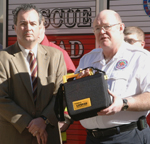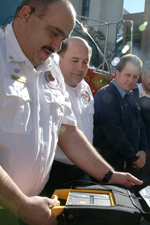Heart Center presents defibrillators to county
The MUSC Heart Center presented 10 automatic external defibrillators
(AED) to Charleston County Emergency Services Department Jan. 28. The device
is used to restart the heart of people struck with sudden cardiac arrest.
These victims’ best hope is having their hearts restarted within four minutes
of being stricken.
The devices will be placed in Charleston County Volunteer Fire and Rescue Squad vehicles that circulate throughout the county. These vehicles can be radio dispatched and often can reach a cardiac arrest victim before the ambulance.
Sudden cardiac arrest strikes about 600 people a day in the United States and as many as a million people a year worldwide. It can strike anyone, anywhere, anytime, although some medical conditions can increase a person’s risk of suffering cardiac arrest.
Sudden cardiac arrest is usually caused by an electrical malfunction of the heart called ventricular fibrillation, an ineffective quivering of the heart muscle that makes it unable to pump blood through the body. Once the blood stops circulating, a person quickly loses consciousness and the ability to breathe. Defibrillation is the only definitive treatment.
 Drs.
Michael R. Gold, left, and Ralph Shealy, medical director, Charleston County
EMS, display the automatic external defibrillators which will be used to
restart the heart of people struck with sudden cardiac arrest.
Drs.
Michael R. Gold, left, and Ralph Shealy, medical director, Charleston County
EMS, display the automatic external defibrillators which will be used to
restart the heart of people struck with sudden cardiac arrest.
“With every passing minute before defibrillation is administered, survival rates from sudden cardiac arrest decrease by about 7 to 10 percent,” said Michael R. Gold, M.D., Ph.D., director of cardiology at MUSC. “Although not everyone can be saved from sudden cardiac arrest, increased access to early defibrillation can help save thousands of lives a year.“
 Members
of the Charleston County Volunteer Fire and Rescue Squad look at one of
the 10 automatic external defibrillators presented to the county's emergency
services Jan. 28. The devices are considered a heart attack victim's best
hope having the heart restarted within four minutes of being stricken.
Members
of the Charleston County Volunteer Fire and Rescue Squad look at one of
the 10 automatic external defibrillators presented to the county's emergency
services Jan. 28. The devices are considered a heart attack victim's best
hope having the heart restarted within four minutes of being stricken.
Unlike the models of defibrillators intended for use by health care professionals, the automatic external defibrillators do not require extensive medical knowledge to understand or operate. The expertise needed to analyze the heart’s electrical function is programmed into the device, enabling nonmedical professionals to respond to cardiac emergencies.
“While the MUSC Heart Center has the most sophisticated cardiac equipment
and highly trained personnel, our expertise will not help sudden cardiac
arrest victims unless they are resuscitated in the field,” said Gold. “When
we were given these devices by Physio-Control Medtronic we had a wonderful
opportunity to make them available to our local emergency responders and
therefore expand services to the citizens of Charleston County.”
Catalyst Online is published weekly, updated as
needed and improved from time to time by the MUSC Office of Public Relations
for the faculty, employees and students of the Medical University of South
Carolina. Catalyst Online editor, Kim Draughn, can be reached at 792-4107
or by email, catalyst@musc.edu. Editorial copy can be submitted to Catalyst
Online and to The Catalyst in print by fax, 792-6723, or by email to petersnd@musc.edu
or catalyst@musc.edu. To place an ad in The Catalyst hardcopy, call Community
Press at 849-1778.